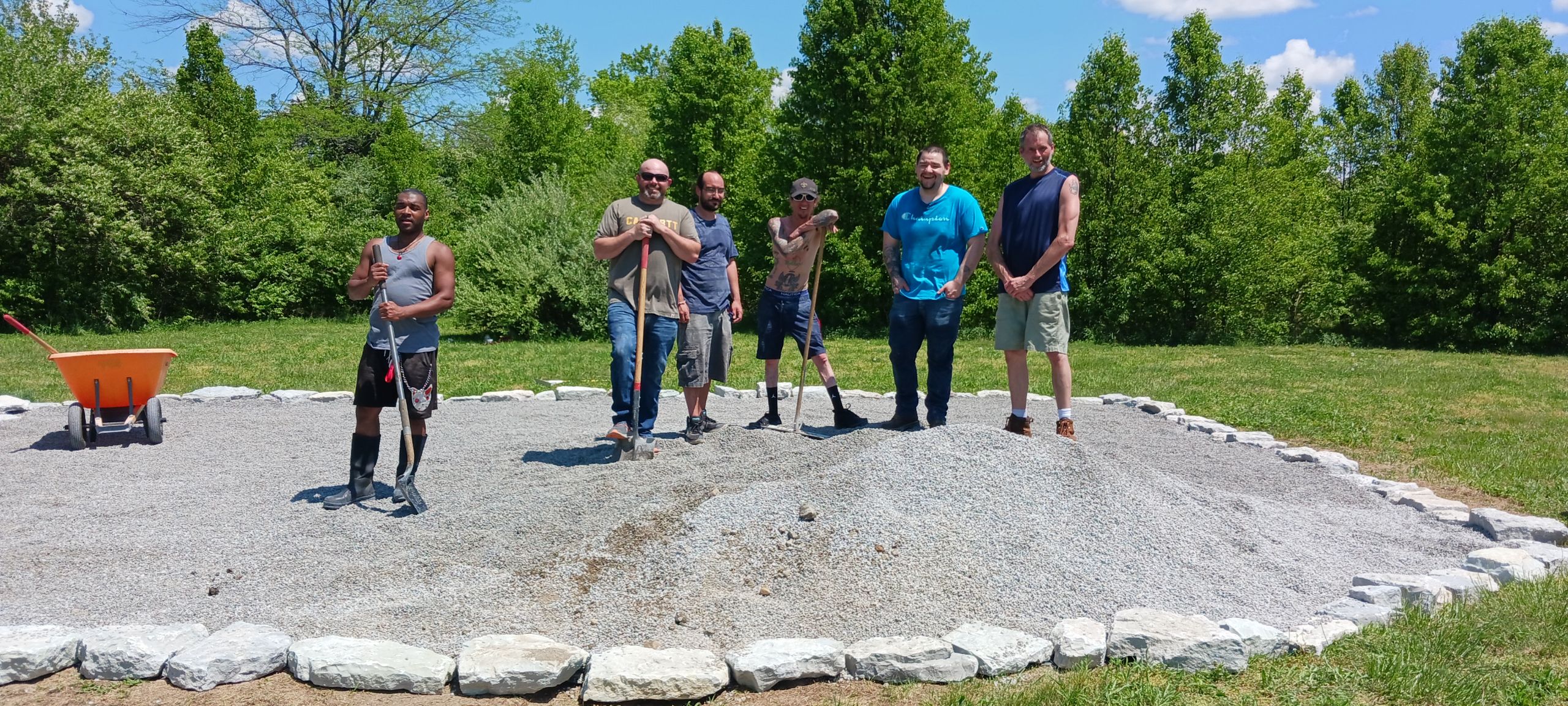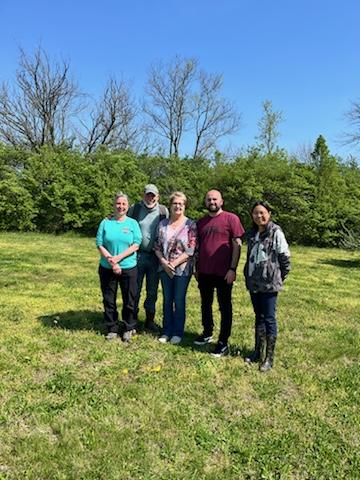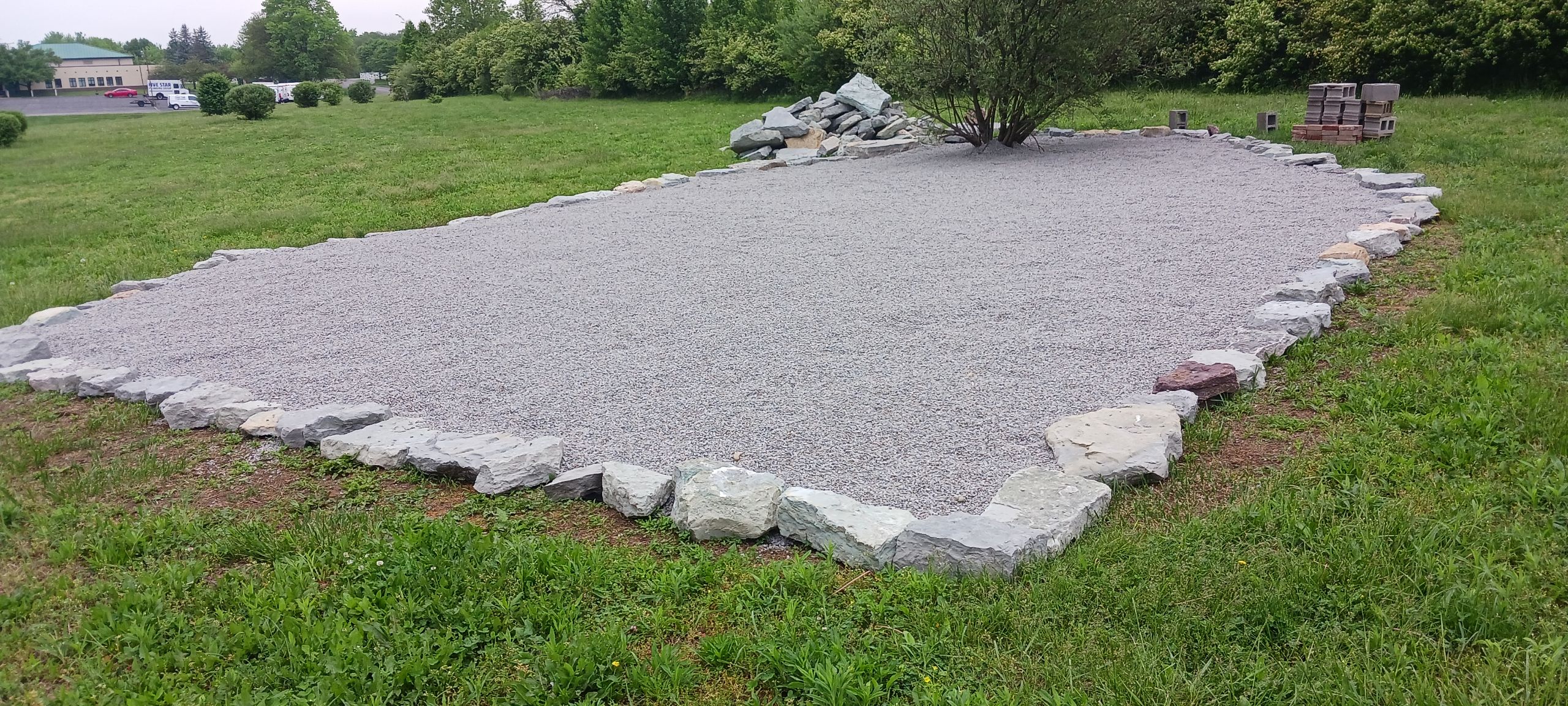What’s the Buzz Lands at Emerge Campus

Partnership with Central State University brings bee hives to Emerge campus
XENIA — A new partnership with Central State University is bringing nearly a dozen fully operational beehives to the campus at Emerge Recovery & Trade Initiative in the coming weeks, as part of a critical ongoing research project.
Doris Jones, director of operations at Emerge, said the hives should be on site in late May; they will be located a safe distance away from the daily operations on campus. Each hive will contain tens of thousands of honeybees that will benefit local agriculture in the area with pollination.
“We are going to cultivate an acre of land surrounding the area with wildflowers; it will take a year for them to fully bloom next spring,” Jones said. “Currently, you can see a big stack of rocks out back passed the outpatient clinical building on the hill where the hives will be located.”
Fairborn Cement, located across the street from Emerge, helped set the site up.
“They gave us the gravel for the base and the stones that will go all the way around the habitat area,” Jones said. “The residents helped get the area ready, spreading the gravel. This is going to be here for many years to come.”
The idea started because Jones and Emerge Administrative Assistant Debbie Paris were looking to do something purposeful with the 45 acres of land available on the campus.
“We have this property, so we asked ourselves: What can we do to maximize its potential and make it available for use for residents,” Jones said. “We want to keep our residents occupied, give them new experiences and get them outside to experience nature, which is very healing.”

Experts say beekeeping is among the hottest trends in 2024.
“Bees are a big thing right now,” Jones said. “They are essential to our agriculture, which is our food. The Xenia area is very farmer friendly. We also have staff that are interested.”
Prior to Emerge forming the new partnership with CSU, Emerge Cofounder Chris Adams set up an apiary at his own house.
“We thought this was a great first step to making our campus more purposeful,” Jones said. “We checked around and it turned out Central State has an apiary program.”
Central State has been conducting research with the bees and was looking for another location to keep hives that was several miles away from their other hives.
Emerge, it turns out, was a great location.
“We are excited about this,” Jones said. “We’ve had a lot of people ask: What are you going to do with all this land? This is one of the first things we came up with. We are also excited because it will benefit the agriculture in the area.”
Jones said Emerge also has a greenhouse coming in the near future as well as raised gardens.
“We want to be a helpful and useful part of the community,” Jones said. “We have a lot of partners that came together for this one community event, and this is something that will benefit the whole area.”
Emerge Commerce Center is a part of the partnership.
“The center provided the space,” said Ben Hays, building administrator at the Emerge Commerce Center. “We wanted to ensure the safest location. We are honored to be a part of this.”

A staff member and beekeeper at the local university explained how the partnership with Emerge came to fruition.
Danielle Kroh of Central State said her longtime friend, Debbie Paris, reached out to her about the possibility of getting bees for the campus.
“She was looking for bee hives,” Kroh said. “I told her that I didn’t have any that I wanted to provide personally, but I connected her to Central State.”
Kroh is the field technician for the bee lab at Central State. She works under Dr. Hongmei Li-Byarlay, who is the research associate professor of entomology, a branch concerned with the study of insects.
“This is the busy season for bees,” Kroh said. “Everything is going on right now. It’s spring and they’re getting out and getting their pollen. They’re producing a lot of eggs and larva and the queen is laying at full capacity. We get a lot of swarms. Emerge wanted to have bees there on campus – to have more educational opportunities there and to learn more about bees. With that, we need another location. The bees we are moving out there are sort of like our stock bees to support our projects when we need them for extra experiments.”
Because of this, having the hives at Emerge is a win-win for everyone involved.
It will benefit organizations, Emerge residents and community partners who are interested in learning more about bees.
“We can now educate anyone out there who wants to learn about bee keeping and how to extract honey,” Kroh said. “They will still be Central State’s bees, but we will have them at Emerge.”
Kroh said a full hive of bees is usually 20,000 to 50,000 bees. Smaller hives have anywhere from 3,000 to 5,000.
“Most of the hives going to Emerge will be full large hives – at least eight to ten of them. There will be some that might be smaller as well,” Kroh said. “I’ve been a beekeeper for nine years. It started with my son, who started when he was nine. We both just kind of fell in love with it. He’s competed at the state fair multiple times. We really enjoy working the bees. It became very interesting.”
Kroh said the hives will only require the designated 10 by 10 foot section.
“It will be a good distance away from people,” she said. “I have 11 hives at home. They are only 100 yards away from my house. They don’t bother anyone unless you go messing with them.”
Soon, Kroh said they will show people how they extract the honey.
“If anyone at Emerge is interested we would be more than happy to show them how to take care of them, what we do with them, how we collect the honey and all the possibilities of products you can make from the hives such as lip balm,” she said. “Then there’s the added benefit of pollination for gardens and local agriculture.”
Community Partners Assist in Apiary Project at Emerge
Joseph Giardullo a longtime retired school teacher from Yellow Springs, is one of the key volunteers bringing this project into fruition.
With an active role in the CSU research program, Giardullo will be assisting in the care of the bee hives at Emerge.
“I live right around the corner in the community,” Giardullo said. “I’m going to help set up the pollinator habitat that we’re going to work on together. We’re going to have some hives there. The goal is to really expose people to nature more and the beautiful environment you have there. It’s a cool idea and it’s cost effective – rather than mowing that area. It’ll be good for the environment. And it’s a win-win for everyone.”
Giardullo said he is excited about the project and excited about working with Emerge.
“Emerge is such an important program for our community,” he said. “Because of this, I am willing to volunteer to help set this up.”
As a retired faculty member from Sinclair University in Dayton, Giardullo said he has his own apiary nearby.
“We’re just going to duplicate that,” he said. “This is a collaboration between us and the community. I’ve been doing this for a while. Beekeeping is a very trendy thing right now. Celebrities are doing this. We are doing this to support some specific research to identify and duplicate the genetics in bees to enable them to be more resistant to mites.”
Critical Research Aimed at Helping Bee Populations Thrive
Giardullo explained that the research they are doing at CSU and at Emerge is very important at this time in our society.
“Mites get on bees as they travel, and they will eat away and get in a hive and kill the bees,” he said. “It’s an infection – a real problem. In the wild, these bees aren’t susceptible to mites. They are more aggressive toward them. They won’t allow them to destroy the hive.”
Domesticated bees, however, have lost this ability,
“We’re taking feral queens and crossing them with domesticated bees to improve their genetics to make the domesticated bees more resilient,” he said. “On my farm, I have hives here that I help maintain with them to help them with this research. There are a lot of good things going on in our world and there are good people like you all at Emerge. We just don’t hear about it enough. I just want to do my part. This is a win-win situation for everyone.”
Giardullo said everyone wants this project to look as nice as possible.
Playing a key role in making this project come together was another key community volunteer, Steve Chaney, and the team at Fairborn Cement Co., located across the street from Emerge. Chaney and his team have their own bee hives as well.
Fairborn Cement donated the gravel for the foundation of the bee area, along with stack stone to surround the area. Residents and staff members at Emerge helped arrange that gravel and prepare the area.
For more information on the program, visit CSU’s Facebook page by clicking here!
For more information about Emerge, to donate or get involved contact Elaine Bonner, Director of Philanthropy at Emerge at 937.974.6120 or visit www.emergerecoverytrade.com



